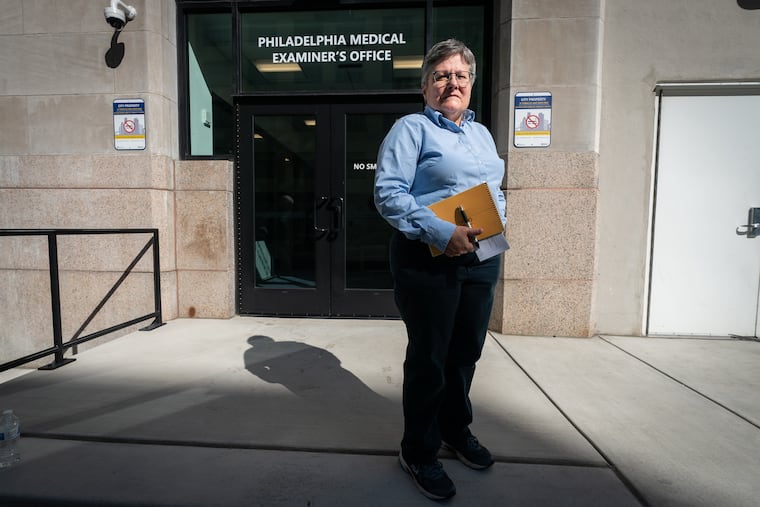After a scathing report, Philly’s medical examiner has started reforms that may take years
While a few recommended reforms for the medical examiner's office have been completed, many steps will take years to resolve.

Four months after an independent report chronicled years of neglected problems in the Philadelphia Medical Examiner’s Office, city officials said change has been incremental so far, with some reforms likely to take years to complete.
The city commissioned an audit of the office after discovering last year remains from the 1985 MOVE bombing abandoned and forgotten on a basement shelf.
A 257-page report released this summer sought to determine how a box of victims remains sat in storage for decades at the office without the knowledge of their families. Eleven people, including five children, died when the city dropped a bomb on the home of a Black liberation group then based in a residential West Philadelphia neighborhood.
The report recommended 16 specific fixes the office needed to take.
The Inquirer asked officials from Philadelphia Department of Public Health, which oversees the medical examiner’s office, about its progress. Six of the recommendations on the to-do list have been implemented. Ten remain works in progress. Here’s an overview of where their efforts stand:
» READ MORE: Read the full report on the mishandling of MOVE victims’ remains
Fixes crossed off the list
Hiring Constance DiAngelo as Chief Medical Examiner was a big step toward addressing the audit’s recommendation to bring in reform-minded leadership.
“That leadership piece is going to be key to putting together a lot of the recommendations,” said Keir Bradford-Grey, a partner at Montgomery McCracken Walker & Rhoads and an author of the report.
The office has also sought to return the remains found in storage. Some have gone to a family member. City officials have declined to say whether all have been returned, saying conversations with the victims’ relatives are confidential.
Among other recommendations now fully addressed:
Amending the cause and manner of death on the death certificates for all 11 people killed in the MOVE bombing. They are now listed as homicide victims, and their cause of death as “homicidal violence.”
Assessing staffing and making hiring recommendations. DiAngelo has requested 20 new positions in the office, including additional investigators and pathologists. The approved 2023 budget for the medical examiner’s office is $7.2 million, about $450,000 more than this year’s allocation.
Developing a mass fatality plan for the office.
Work on remains or specimens that requires outside expertise now must be done within the medical examiner’s office. If that isn’t possible, the office has introduced a tracking system to ensure the remains don’t stay out of the office longer than necessary. All material must go back to the office when any studies or tests are done.
Efforts underway to meet national standards
About 4% of the nation’s 2,500 medical examiner’s offices were accredited as of 2016, though Philadelphia is one of the few among the country’s top 10 biggest cities without such accreditation. The report recommended the office seek accreditation, which signifies that it meets professional standards.
The report also recommended the office create policy manuals, which are necessary to obtain national accreditation. DiAngelo said in a recent interview assembling policy guidelines are among her priorities.
» READ MORE: A department in need of a shake-up has a new boss.
The report urged the office to improve communication with victims’ families. Working with grieving families requires sensitivity, DiAngelo said, which she hopes to work on with staff through mentoring. “This is where the art of medicine can come in,” she said.
The office does not need family permission to conduct a death investigation, which can include an autopsy, but can help families better understand what to expect by updating the office’s website with more information about its procedures, she said.
Other reforms remain years off
The city said other recommendations in the report have been partially addressed, or could take years to implement. Here’s what was recommended, and what progress has been made since its release in June:
Prioritizing investigations into homicides, especially when law enforcement is involved.
Investigators now are dispatched to any police-involved deaths in the city, though more staff is needed to ensure that happens quickly, officials said.
DiAngelo wants to get investigators on scene for child deaths and those in which the victim’s body has decomposed. As of the beginning of October, the Medical Examiner’s Office had nine investigators and one supervisor. To meet her goal, she has asked to hire nine more investigators.
Independent legal counsel to address conflicts
Since the report’s release no legal conflicts have required the use of external representation, city officials said.
Adopt standards ensuring the office’s independence and impartiality and training employees in cultural diversity.
DiAngelo has said it’s important for the medical examiner’s office to act as an investigative entity separate from police.
The Mayor’s Office of Diversity, Equity and Inclusion will train the office’s managers and supervisors in DEI in 2023.
Develop policies around the storage of human remains and personal belongings and audit the office’s storage rooms.
Office policy requires any unclaimed personal effects be inventoried and discarded after five years absent a written request or need to retain it. Starting July 11, the office began doing storage rooms audits quarterly.
The office is developing a policy for how to handle retained human specimens, such as bones and blood.
The report also noted — but did not include as a specific reform recommendation — the importance of a commemoration of the event in Philadelphia and grave markers for the bombing victims interred at Eden Cemetery, a historic burial ground in Darby.
The cemetery requires consent from plot owners to erect grave markers, a health official said. The city is working with bombing victims’ families to develop a memorial.